Float like a butterfly, sting like a bee.
“Heroes arrive when we need them most. They define us and point us in a direction. To turn our sights at this moment toward an idea of America that is heroic does, admittedly, require an act of will. Well, our country has been nothing if not an act of will. To begin a redefinition of the American hero…is an act of will that says that whatever else we may actually be, it's to this that we aspire” (Granger). In his essay “Boy, Do We Ever Need a Hero,” David Granger argues that America will always need heroes as long as we aspire to be greater than we are. If a will to improve society exists, the world can use a hero. Heroes fill a need within society, and as society changes, the kind of heroes needed also changes. Throughout history, different challenges have produced many different heroes. For example, when women did not have the right to vote, heroes like Susan B. Anthony fought for women’s rights. When India was oppressed by British rule, heroes like Mahatma Gandhi, fought for Indian independence. During the civil rights movement, heroes like Martin Luther King, Jr. provided an example of what society should aspire to. True heroes have a vision for the changes they want to see in the world. They can see the shortfalls of society and rise up to become a hero or champion, fighting for their cause. Oftentimes, the fight is not a physical one, but rather a fight to change views and stereotypes; after all, changing the way society thinks will surely be met with criticism and opposition. Therefore, just as important as the vision, a hero needs the courage, the integrity, and the will to fight.
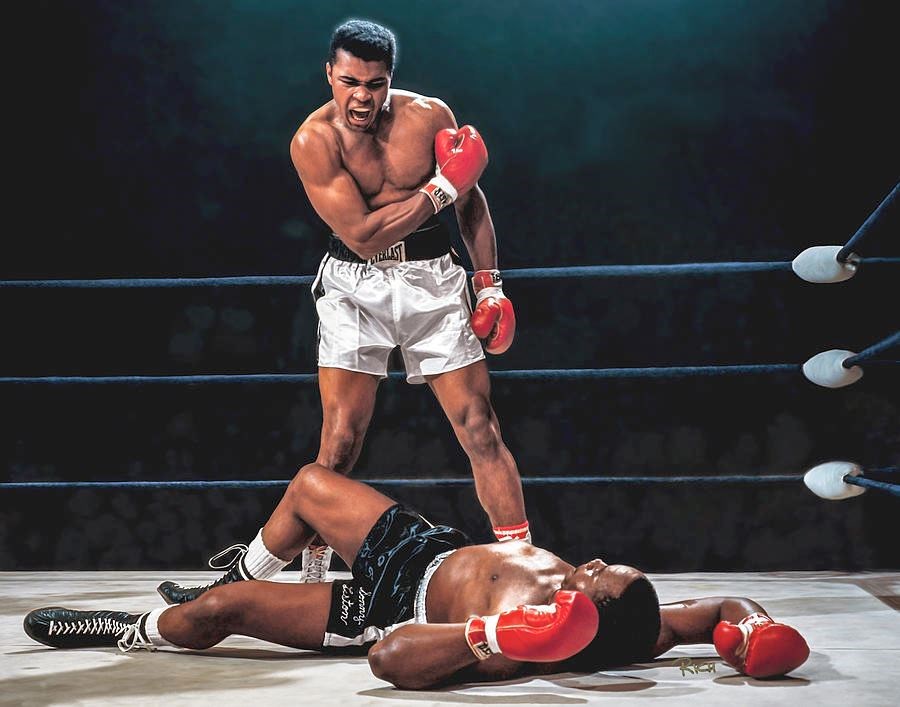 Muhammad Ali knocks out Sonny Listonhttps://fineartamerica.com/featured/muhammad-ali-boxer-knocks-out-sonny-liston-cassius-marcellus-clay-boxing-legend-rich-image.htmlMuhammad Ali was one of these heroes. Ali was born as Cassius Clay, Jr. in Louisville, Kentucky in 1942, during the time of Jim Crow laws and segregation. At the age of 12, Clay started boxing in a local gym. Clay’s boxing style was unique, as he kept his hands down and relied on his speed to dodge punches. His boxing style embodied his mantra, “Float like a butterfly, sting like a bee. His hands can’t hit what his eyes can’t see.” After devoting much of his time to boxing, Clay became an Olympic champion, winning a gold medal in 1960, and in 1964, he defeated Sonny Liston to be crowned the heavyweight champion of the world. Despite these accomplishments, Clay was still denied service at restaurants in his hometown because of the color of his skin. Clay realized the corruption within America’s sense of civil rights, and he announced his conversion to the Nation of Islam under his new name, Muhammad Ali. In 1967, Ali was drafted into the military to fight in the Vietnam War, but he refused the draft, stating that it was against his religious and moral beliefs. This led to him being stripped of his boxing license and his heavyweight title, and he was sentenced to five years in prison. Ali was unable to box during the prime of his career. However, the Supreme Court overturned the sentence in 1971 and returned Ali’s boxing license. He went on to earn an unprecedented three heavyweight titles and finished his career with 56 wins, 5 losses, and 37 knockouts. He was diagnosed with Parkinson’s disease in 1984, but Ali’s work was not finished. Sports Illustrated honored Ali with the Sportsman of the Century award in 1999 and the Sportsman Legacy award in 2015. His accomplishments exceeded just the boxing ring; he received the Presidential Medal of Freedom in 2005, the President’s award from the NAACP, and was appointed as a UN Messenger of Peace. Throughout his life, Ali demonstrated courage and integrity, two core characteristics of a hero. Courage is the ability to act through adversity, and integrity means standing true to your morals. Ali’s success as a boxer gave him a voice that demonstrated his courage and unwavering integrity although he was oftentimes met with opposition, proving he truly deserves the title of “The Greatest.”
Muhammad Ali knocks out Sonny Listonhttps://fineartamerica.com/featured/muhammad-ali-boxer-knocks-out-sonny-liston-cassius-marcellus-clay-boxing-legend-rich-image.htmlMuhammad Ali was one of these heroes. Ali was born as Cassius Clay, Jr. in Louisville, Kentucky in 1942, during the time of Jim Crow laws and segregation. At the age of 12, Clay started boxing in a local gym. Clay’s boxing style was unique, as he kept his hands down and relied on his speed to dodge punches. His boxing style embodied his mantra, “Float like a butterfly, sting like a bee. His hands can’t hit what his eyes can’t see.” After devoting much of his time to boxing, Clay became an Olympic champion, winning a gold medal in 1960, and in 1964, he defeated Sonny Liston to be crowned the heavyweight champion of the world. Despite these accomplishments, Clay was still denied service at restaurants in his hometown because of the color of his skin. Clay realized the corruption within America’s sense of civil rights, and he announced his conversion to the Nation of Islam under his new name, Muhammad Ali. In 1967, Ali was drafted into the military to fight in the Vietnam War, but he refused the draft, stating that it was against his religious and moral beliefs. This led to him being stripped of his boxing license and his heavyweight title, and he was sentenced to five years in prison. Ali was unable to box during the prime of his career. However, the Supreme Court overturned the sentence in 1971 and returned Ali’s boxing license. He went on to earn an unprecedented three heavyweight titles and finished his career with 56 wins, 5 losses, and 37 knockouts. He was diagnosed with Parkinson’s disease in 1984, but Ali’s work was not finished. Sports Illustrated honored Ali with the Sportsman of the Century award in 1999 and the Sportsman Legacy award in 2015. His accomplishments exceeded just the boxing ring; he received the Presidential Medal of Freedom in 2005, the President’s award from the NAACP, and was appointed as a UN Messenger of Peace. Throughout his life, Ali demonstrated courage and integrity, two core characteristics of a hero. Courage is the ability to act through adversity, and integrity means standing true to your morals. Ali’s success as a boxer gave him a voice that demonstrated his courage and unwavering integrity although he was oftentimes met with opposition, proving he truly deserves the title of “The Greatest.”
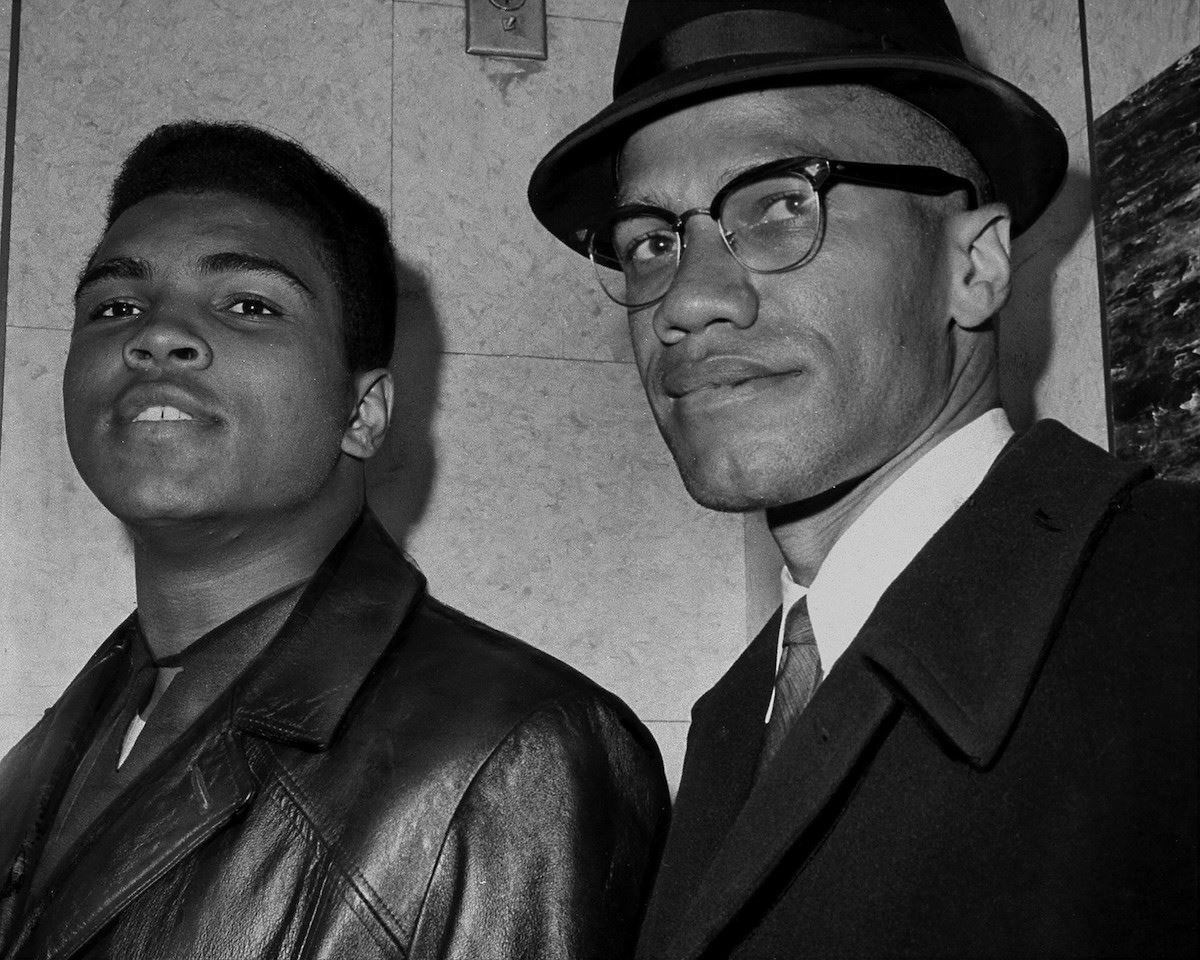 Ali and Malcolm Xhttps://time.com/4200219/muhammad-ali-meets-malcolm-x/Muhammad Ali showed courage by breaking through racial stereotypes and being true to himself regardless of how the public would perceive him. At the time, a typical black boxer was just expected to box: “Sportswriters… felt [Ali] should be grateful for the chance to compete in the ring…In short, he was expected to lose his identity as a black person because he was an athlete. Instead, Ali emphasized his position as a black man in boxing and offered himself as an example of what a black man can accomplish” (Remnick 154-155). From the start of his career, Ali proved time and time again he would not be like other boxers. Unlike the black boxers before him who relied on others to speak on their behalf, Ali personally taunted his opponents and did not stop talking, earning him the nickname, the Louisville Lip. Although he was criticized for being disrespectful, people were listening. Boxing gave him a voice. Ali could have fit his audience’s idea of a boxer: a boxer that started no controversy, a boxer with humility, a boxer that kept America comfortable. But Ali continued to challenge society’s expectations. The fact that Muhammad Ali gave up popularity to build up a voice and presence in the boxing community truly shows courage, which further extended to pride in the African American community. Similarly, Ali faced opposition regarding his conversion to the Nation of Islam, as the Muslim religion was considered radical at the time. The religion did not embrace integration; rather, it spread a separatist message that was not popular among both whites and blacks: “[Ali] had been faced with a clear choice. He could have kept his given name and continued his religious conversion in private, out of the public eye, and enjoyed years of uninterrupted fame” (Myers 48). The difference between public and private is emphasized here. Keeping his religion private may have made him more popular, but Ali chose not to hide his true beliefs, which displays courage. Ali never gave into his critics. He continued placing public opinion aside and had the courage to challenge society’s expectations, which would later inspire a generation.
Ali and Malcolm Xhttps://time.com/4200219/muhammad-ali-meets-malcolm-x/Muhammad Ali showed courage by breaking through racial stereotypes and being true to himself regardless of how the public would perceive him. At the time, a typical black boxer was just expected to box: “Sportswriters… felt [Ali] should be grateful for the chance to compete in the ring…In short, he was expected to lose his identity as a black person because he was an athlete. Instead, Ali emphasized his position as a black man in boxing and offered himself as an example of what a black man can accomplish” (Remnick 154-155). From the start of his career, Ali proved time and time again he would not be like other boxers. Unlike the black boxers before him who relied on others to speak on their behalf, Ali personally taunted his opponents and did not stop talking, earning him the nickname, the Louisville Lip. Although he was criticized for being disrespectful, people were listening. Boxing gave him a voice. Ali could have fit his audience’s idea of a boxer: a boxer that started no controversy, a boxer with humility, a boxer that kept America comfortable. But Ali continued to challenge society’s expectations. The fact that Muhammad Ali gave up popularity to build up a voice and presence in the boxing community truly shows courage, which further extended to pride in the African American community. Similarly, Ali faced opposition regarding his conversion to the Nation of Islam, as the Muslim religion was considered radical at the time. The religion did not embrace integration; rather, it spread a separatist message that was not popular among both whites and blacks: “[Ali] had been faced with a clear choice. He could have kept his given name and continued his religious conversion in private, out of the public eye, and enjoyed years of uninterrupted fame” (Myers 48). The difference between public and private is emphasized here. Keeping his religion private may have made him more popular, but Ali chose not to hide his true beliefs, which displays courage. Ali never gave into his critics. He continued placing public opinion aside and had the courage to challenge society’s expectations, which would later inspire a generation.
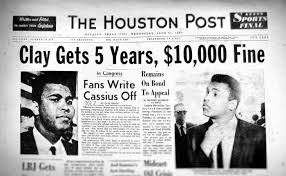 Muhammad Ali evading the draft makes news headlines.https://fightland.vice.com/blog/the-draft-dodger-alis-fight-against-an-unjust-war-and-the-country-that-waged-itMuhammad Ali demonstrated integrity by taking a stand against the highly controversial Vietnam War, showing once again that his greatness extended beyond the boxing ring. Many people were against the war, but they were afraid to voice their opposition. Muhammad Ali expressed his beliefs through evading the draft: "I'm giving up my title, my wealth, maybe my future. Many great men have been tested for their religious beliefs. If I pass this test, I'll come out stronger than ever” (“Muhammad Ali”, Contemporary). Evading the draft tested Ali’s morals because fighting the war would have been against his religious beliefs. The draft became an obstacle that would define his integrity. Ali was willing to sacrifice his fame and wealth to stay true to what he believes, therefore making him a hero. His “passing the test” to make him “stronger than ever” illustrates that he believes wealth and power do not make a strong hero, but rather a strong moral conscience defines a person’s strength. A hero must express his or her true feelings, even when the consequences are not favorable, which is what Ali sincerely exhibited. In an interview with his biographer, Thomas Hauser, concerning his draft evasion, Ali fought for his true feelings: “Freedom means being able to follow your religion, but it also means carrying the responsibility to choose between right and wrong…So when the time came for me to make up my mind about going into the army, I knew people were dying in Vietnam for nothing and I should live by what I thought was right. I wanted America to be America” (Myers 63-64). Here, Ali recognizes two opposing views. Many people felt he should have accepted the draft and fought for his country, and critics would say that Muhammad Ali was being unpatriotic for dodging the war. In reality, he showed patriotism by defending America, a symbol of freedom, freedom of speech, freedom of choice, and overall justice. Ali demonstrated his integrity by standing up for what he believed, regardless of whether people deemed his actions right or wrong.
Muhammad Ali evading the draft makes news headlines.https://fightland.vice.com/blog/the-draft-dodger-alis-fight-against-an-unjust-war-and-the-country-that-waged-itMuhammad Ali demonstrated integrity by taking a stand against the highly controversial Vietnam War, showing once again that his greatness extended beyond the boxing ring. Many people were against the war, but they were afraid to voice their opposition. Muhammad Ali expressed his beliefs through evading the draft: "I'm giving up my title, my wealth, maybe my future. Many great men have been tested for their religious beliefs. If I pass this test, I'll come out stronger than ever” (“Muhammad Ali”, Contemporary). Evading the draft tested Ali’s morals because fighting the war would have been against his religious beliefs. The draft became an obstacle that would define his integrity. Ali was willing to sacrifice his fame and wealth to stay true to what he believes, therefore making him a hero. His “passing the test” to make him “stronger than ever” illustrates that he believes wealth and power do not make a strong hero, but rather a strong moral conscience defines a person’s strength. A hero must express his or her true feelings, even when the consequences are not favorable, which is what Ali sincerely exhibited. In an interview with his biographer, Thomas Hauser, concerning his draft evasion, Ali fought for his true feelings: “Freedom means being able to follow your religion, but it also means carrying the responsibility to choose between right and wrong…So when the time came for me to make up my mind about going into the army, I knew people were dying in Vietnam for nothing and I should live by what I thought was right. I wanted America to be America” (Myers 63-64). Here, Ali recognizes two opposing views. Many people felt he should have accepted the draft and fought for his country, and critics would say that Muhammad Ali was being unpatriotic for dodging the war. In reality, he showed patriotism by defending America, a symbol of freedom, freedom of speech, freedom of choice, and overall justice. Ali demonstrated his integrity by standing up for what he believed, regardless of whether people deemed his actions right or wrong.
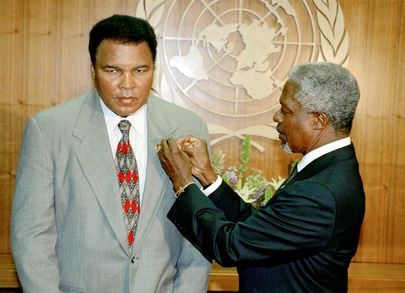 Secretary-General recognizes Ali as UN Messenger of Peacehttps://www.unmultimedia.org/photo/detail.jsp?id=789/78974&key=9&query=subject:%22Sport%20for%20Development%20and%20Peace%22&so=0&sf=dateMuhammad Ali filled a need in society. He used his boxing as a platform to spread his voice and transcend the stereotypes he faced. Although his beliefs were not always popular, Ali remained passionate about what he deemed just. He acted with courage and integrity, and he did it with style. He had his share of critics, but nobody could deny his definite charisma and sense of humor: “Every time that Muhammad Ali looked in the mirror and said ‘I’m so pretty,’ what he was really saying — before it became fashionable — is ‘black is beautiful’... I can’t tell you how many people … have come up to me and said, ‘Before Muhammad Ali, I thought it was better to be white than black. I was ashamed of my color, and Ali made me proud. Ali made me just as happy to be black as somebody else being white'” (Holland). Muhammad Ali’s confidence boosted the confidence and self-esteem of others in the black community through the tough times of segregation. His confidence, courage, and integrity transcended the racial boundaries placed on African Americans; however, these qualities are an inspiration that everyone could benefit from. It’s probably safe to say I will never win a heavyweight championship. I doubt my scrawny frame would ever be able to knock out Sonny Liston. But as I watched footage of Ali lighting the torch in the opening ceremony of the 1996 Olympic Games, I realized what Ali meant to the thousands of people in the stadium that day. It had been 12 years since his diagnosis with Parkinson’s disease, and his body shook; yet, “The Greatest,” the “King of the World” stood just as victorious as if he had just knocked out someone for the heavyweight title. It was another act of courage. Although boxing gave him a voice, he no longer needed to box to be recognized for greatness. The fact that his accomplishments transcended the boxing ring actually made him “The Greatest.” Similarly, we don’t need to climb into a ring to conquer our battles or achieve our goals. Ali was only 18 years old when he claimed he would be a heavyweight champion. He believed it, so he became it. If we believe we deserve greatness, maybe we will find our own purpose. If I believe I can play in a professional symphony, it just might happen. If I believe I can get into a prestigious college, it just might happen. Ali arrived when the world needed him most. He points us in a direction that above all else, leads one to find their purpose, train with discipline and passion, believe in oneself, and live with courage and integrity. Perhaps, “The Greatest” lies inside all of us.
Secretary-General recognizes Ali as UN Messenger of Peacehttps://www.unmultimedia.org/photo/detail.jsp?id=789/78974&key=9&query=subject:%22Sport%20for%20Development%20and%20Peace%22&so=0&sf=dateMuhammad Ali filled a need in society. He used his boxing as a platform to spread his voice and transcend the stereotypes he faced. Although his beliefs were not always popular, Ali remained passionate about what he deemed just. He acted with courage and integrity, and he did it with style. He had his share of critics, but nobody could deny his definite charisma and sense of humor: “Every time that Muhammad Ali looked in the mirror and said ‘I’m so pretty,’ what he was really saying — before it became fashionable — is ‘black is beautiful’... I can’t tell you how many people … have come up to me and said, ‘Before Muhammad Ali, I thought it was better to be white than black. I was ashamed of my color, and Ali made me proud. Ali made me just as happy to be black as somebody else being white'” (Holland). Muhammad Ali’s confidence boosted the confidence and self-esteem of others in the black community through the tough times of segregation. His confidence, courage, and integrity transcended the racial boundaries placed on African Americans; however, these qualities are an inspiration that everyone could benefit from. It’s probably safe to say I will never win a heavyweight championship. I doubt my scrawny frame would ever be able to knock out Sonny Liston. But as I watched footage of Ali lighting the torch in the opening ceremony of the 1996 Olympic Games, I realized what Ali meant to the thousands of people in the stadium that day. It had been 12 years since his diagnosis with Parkinson’s disease, and his body shook; yet, “The Greatest,” the “King of the World” stood just as victorious as if he had just knocked out someone for the heavyweight title. It was another act of courage. Although boxing gave him a voice, he no longer needed to box to be recognized for greatness. The fact that his accomplishments transcended the boxing ring actually made him “The Greatest.” Similarly, we don’t need to climb into a ring to conquer our battles or achieve our goals. Ali was only 18 years old when he claimed he would be a heavyweight champion. He believed it, so he became it. If we believe we deserve greatness, maybe we will find our own purpose. If I believe I can play in a professional symphony, it just might happen. If I believe I can get into a prestigious college, it just might happen. Ali arrived when the world needed him most. He points us in a direction that above all else, leads one to find their purpose, train with discipline and passion, believe in oneself, and live with courage and integrity. Perhaps, “The Greatest” lies inside all of us.
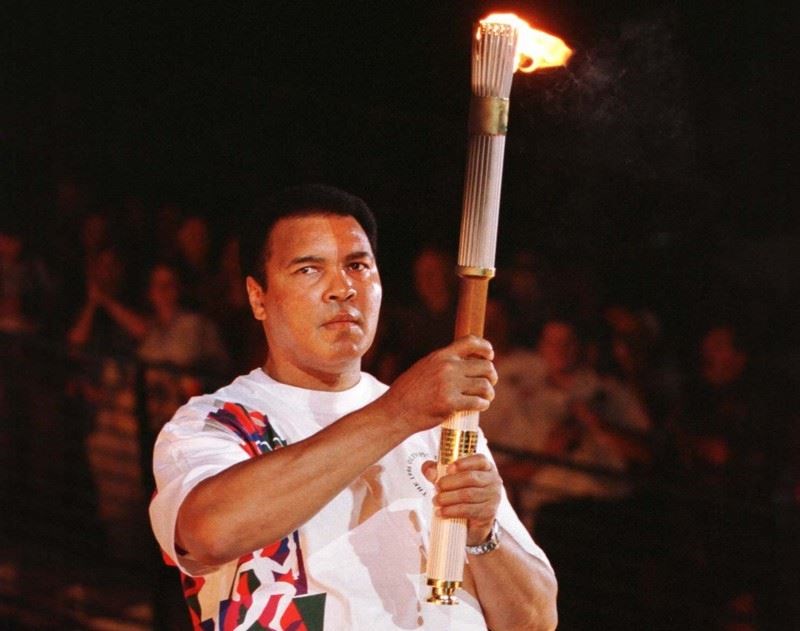 Ali holding the 1996 Olympic Torchhttps://www.ajc.com/sports/surprise-visitor-ali-lights-olympic-flame/Rji0NqFN3QSAQ50Q40ughJ/Works Cited
Ali holding the 1996 Olympic Torchhttps://www.ajc.com/sports/surprise-visitor-ali-lights-olympic-flame/Rji0NqFN3QSAQ50Q40ughJ/Works Cited
Granger, David. "Boy, Do We Ever Need a Hero." Esquire, vol. 130, no. 5, Nov. 1998, p. 26.
EBSCOhost
Holland, Jesse J. “Muhammad Ali’s confidence, cockiness made him symbol of black
pride.” Boston.com, The Boston Globe, 6 June 2016, www.boston.com/sports/sports-news/2016/06/06/muhammad-alis-confidence-cockiness-made-symbol-black-pride.
“Muhammad Ali.” Biography.com, A&E Networks Television, 7 Nov. 2017,
www.biography.com/people/muhammad-ali-9181165. Accessed 31 December 2017
"Muhammad Ali." Contemporary Black Biography, vol. 52, Gale, 2006. Biography in Context,
Accessed 28 Dec. 2017.
Myers, Walter Dean. GREATEST: Muhammad Ali. Scholastic (US), 2001.
Remnick, David. King of the world. Random House, 1998.
Page created on 2/17/2018 3:22:05 AM
Last edited 2/25/2018 11:21:20 PM
